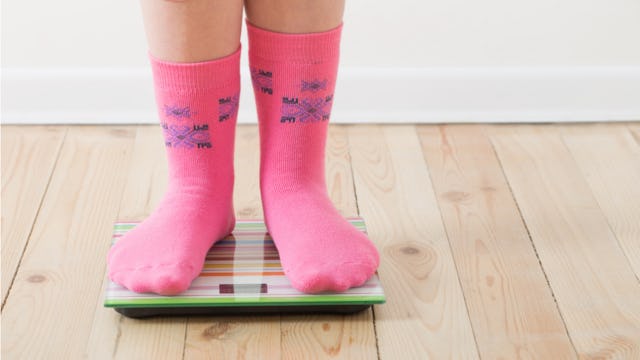Please Don't Tell Your Kids They're Getting Fat Or Need To Lose Weight

My kids were the chunkiest babies you’ve ever seen. I have pictures of each of them at 6 months with rolls upon rolls of baby fat cascading down their thighs. I’d get comments all the time about their heft (as well as looks of shock when I told people it was all breast milk), but since they were babies, everyone thought it was cute.
My babes were huge, but they were healthy. As they transitioned to toddlerhood, they thinned out. And as they’ve gone through growth spurts over the years, I’ve watched how they gain width for a little while only to slim down again once their height shoots up.
While I’ve silently observed the changes in my kids’ bodies, I’ve made it a point never to mention their weight, especially in any kind of a negative way — a conscious choice made from years of hearing about friends’ body image issues.
My friend Joanna has struggled with obesity most of her life. She’s described how her parents used to make comments about her weight when she was growing up and how her mom put her on a diet at a very young age. Consequently, she ended up with a lifelong rocky relationship with self-esteem, body image, and food.
It’s a classic pattern. But parents often think they’re doing the right thing in telling their kids that they’re getting chubby or need to lose weight. We’ve all heard of the perils of childhood obesity, and we all want our kids to be healthy.
But criticizing a child’s weight or body composition is a surefire way to set them up to be unhealthy, both physically and emotionally. A study published in the Eating and Weight Disorders journal found that women who recalled comments their parents made about their weight were more dissatisfied with their adult weight — even those who were a healthy weight as adults.
Kids are more sensitive to the messages we send them. When a child hears that they are getting fat or that they need to lose weight, they’re hearing that something is wrong with them. Their bodies are changing so much so fast, and they often feel like they have very little control over those changes. Being told that they need to do something about how their body is changing can be confusing and disempowering.
And the truth is, everybody is different, and some seemingly excess fat is not necessarily an indicator of poor health. There are plenty of thin people who are unhealthy and plenty of chubbier folks whose health is just fine. As I said, my kids always put on some extra weight before a growth spurt. So what? It’s much more important to me that our family practice healthy habits than get caught up in our societal preoccupation with fat.
Instead of focusing on kids’ weight, try focusing on good health. We can talk to our kids about the importance of putting healthy food into our bodies as fuel and practicing moderation with sugary desserts and other treats. We can talk about eating when you’re hungry and stopping before you’re stuffed in order to promote good digestion. We can provide healthy food in our homes and try to model wise choices when it comes to eating.
Rather than suggesting that a kid needs to exercise to lose weight, we can talk with our kids about how our bodies are made to move and how much better we feel when we are active. We can talk about keeping our bones and muscles strong through exercise. We can take our family out on physically active outings and model making regular exercise a priority in our household.
And we can do all of the above without ever telling a kid that he or she is fat or needs to lose weight. Those kinds of statements are not helpful, and they are likely to cause lasting harm for your child.
Kids’ bodies are changing all the time. They may go through phases of being fatter or slimmer, of being more or less muscular. They don’t need to hear anything other than how amazing and capable their bodies are, how awesome it is that they have all these different parts that work together to allow them to run, jump, swim, and play.
When they internalize that their bodies are the incredible machines that they are, healthy choices will follow. They don’t need to hear that they are not measuring up in some way, like it is some personal failure on their part, because that is not the case. As long as we serve as role models and exemplify a lifestyle that leads to good health, our kids will get the messages they need from us and their self-esteem will remain intact.